Critical Analysis of 'Some Lessons Learned from the Assembly Line'
VerifiedAdded on 2022/12/26
|7
|1149
|21
Homework Assignment
AI Summary
This homework assignment presents a critical analysis of Andrew Braaksma's essay, "Some Lessons Learned from the Assembly Line." The analysis addresses several key questions from the assignment brief, including an overview of the essay's main points, the author's goal, and supporting evidence. The author emphasizes the importance of higher education, contrasting it with the experiences of blue-collar workers. The analysis explores the author's perspective on the value of college education and professional experience, as well as the author's observations about the youth's perspective on education. The student's responses reflect agreement with the author's key points and provide evidence to support the author's claims, highlighting the significance of higher education for career advancement and a more secure future. The analysis concludes by reinforcing the importance of education and professional experience in shaping an individual's career prospects.
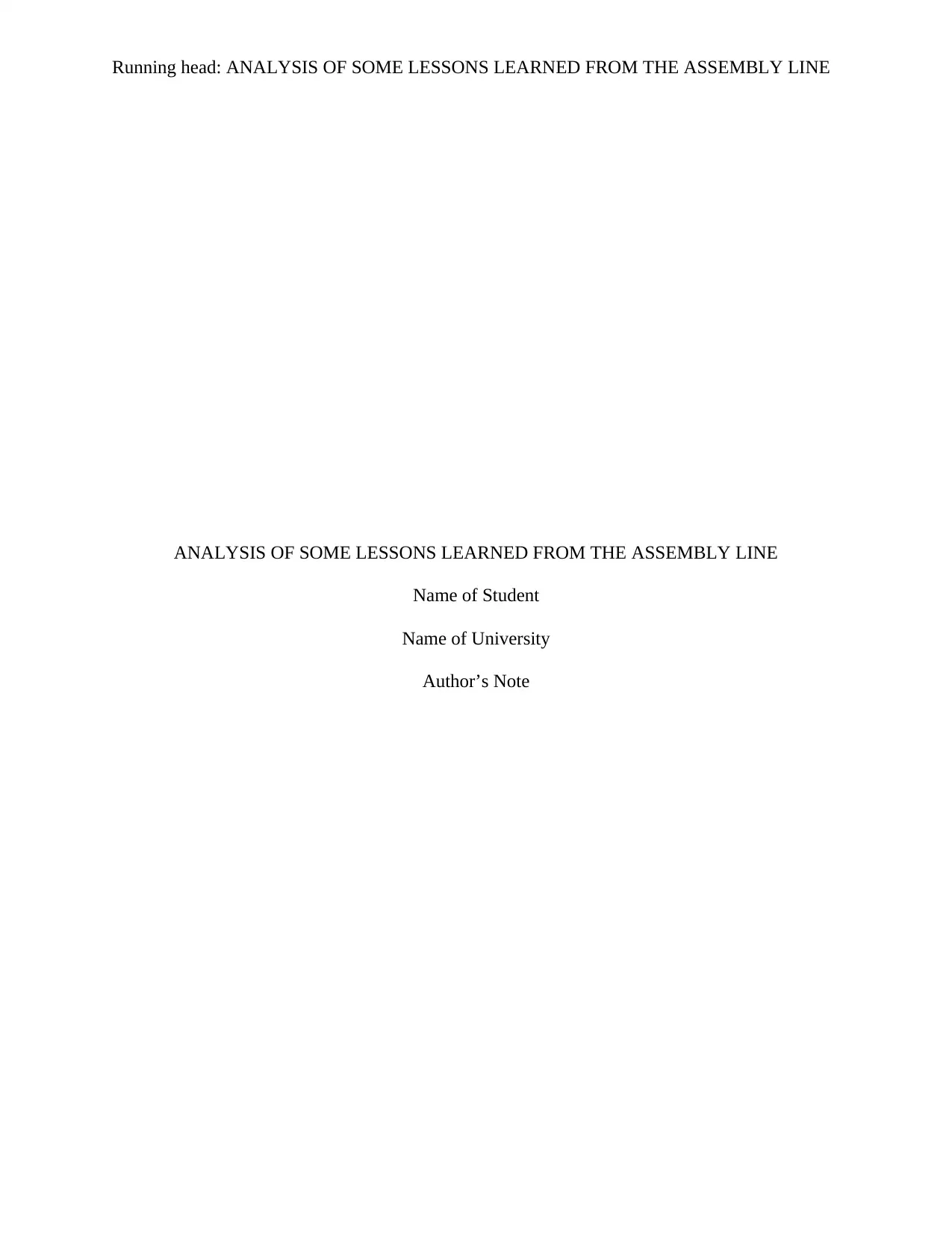
Running head: ANALYSIS OF SOME LESSONS LEARNED FROM THE ASSEMBLY LINE
ANALYSIS OF SOME LESSONS LEARNED FROM THE ASSEMBLY LINE
Name of Student
Name of University
Author’s Note
ANALYSIS OF SOME LESSONS LEARNED FROM THE ASSEMBLY LINE
Name of Student
Name of University
Author’s Note
Paraphrase This Document
Need a fresh take? Get an instant paraphrase of this document with our AI Paraphraser
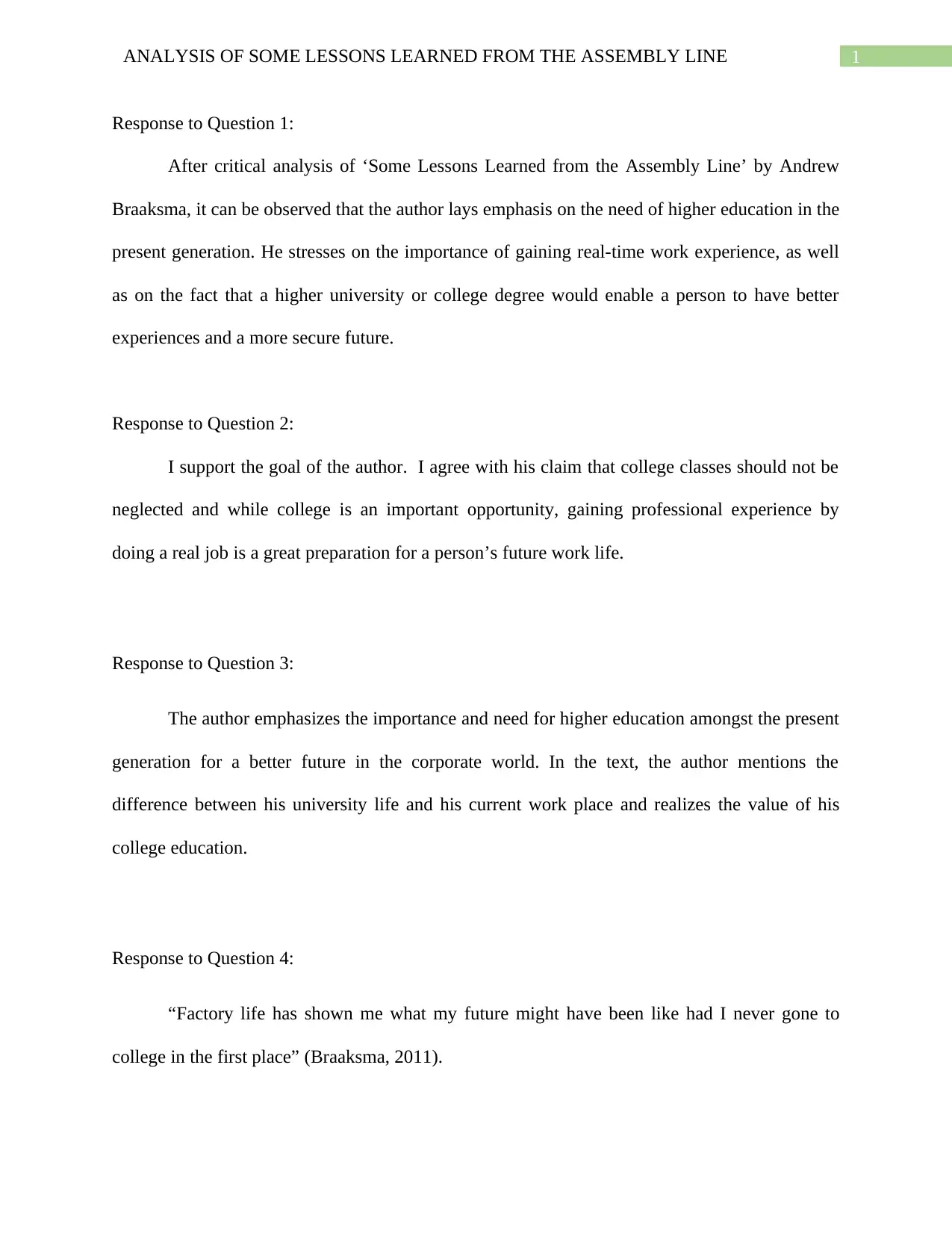
1ANALYSIS OF SOME LESSONS LEARNED FROM THE ASSEMBLY LINE
Response to Question 1:
After critical analysis of ‘Some Lessons Learned from the Assembly Line’ by Andrew
Braaksma, it can be observed that the author lays emphasis on the need of higher education in the
present generation. He stresses on the importance of gaining real-time work experience, as well
as on the fact that a higher university or college degree would enable a person to have better
experiences and a more secure future.
Response to Question 2:
I support the goal of the author. I agree with his claim that college classes should not be
neglected and while college is an important opportunity, gaining professional experience by
doing a real job is a great preparation for a person’s future work life.
Response to Question 3:
The author emphasizes the importance and need for higher education amongst the present
generation for a better future in the corporate world. In the text, the author mentions the
difference between his university life and his current work place and realizes the value of his
college education.
Response to Question 4:
“Factory life has shown me what my future might have been like had I never gone to
college in the first place” (Braaksma, 2011).
Response to Question 1:
After critical analysis of ‘Some Lessons Learned from the Assembly Line’ by Andrew
Braaksma, it can be observed that the author lays emphasis on the need of higher education in the
present generation. He stresses on the importance of gaining real-time work experience, as well
as on the fact that a higher university or college degree would enable a person to have better
experiences and a more secure future.
Response to Question 2:
I support the goal of the author. I agree with his claim that college classes should not be
neglected and while college is an important opportunity, gaining professional experience by
doing a real job is a great preparation for a person’s future work life.
Response to Question 3:
The author emphasizes the importance and need for higher education amongst the present
generation for a better future in the corporate world. In the text, the author mentions the
difference between his university life and his current work place and realizes the value of his
college education.
Response to Question 4:
“Factory life has shown me what my future might have been like had I never gone to
college in the first place” (Braaksma, 2011).
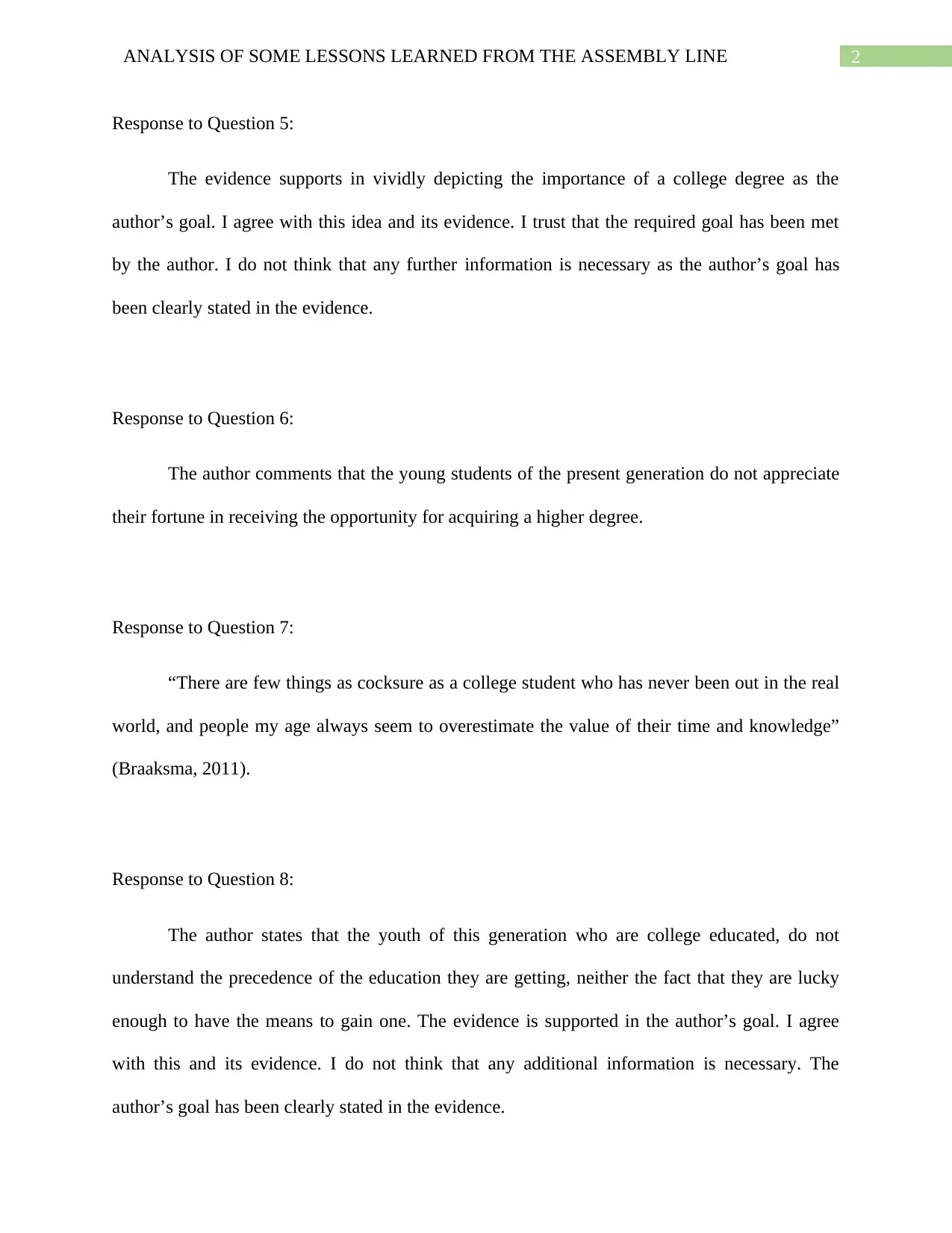
2ANALYSIS OF SOME LESSONS LEARNED FROM THE ASSEMBLY LINE
Response to Question 5:
The evidence supports in vividly depicting the importance of a college degree as the
author’s goal. I agree with this idea and its evidence. I trust that the required goal has been met
by the author. I do not think that any further information is necessary as the author’s goal has
been clearly stated in the evidence.
Response to Question 6:
The author comments that the young students of the present generation do not appreciate
their fortune in receiving the opportunity for acquiring a higher degree.
Response to Question 7:
“There are few things as cocksure as a college student who has never been out in the real
world, and people my age always seem to overestimate the value of their time and knowledge”
(Braaksma, 2011).
Response to Question 8:
The author states that the youth of this generation who are college educated, do not
understand the precedence of the education they are getting, neither the fact that they are lucky
enough to have the means to gain one. The evidence is supported in the author’s goal. I agree
with this and its evidence. I do not think that any additional information is necessary. The
author’s goal has been clearly stated in the evidence.
Response to Question 5:
The evidence supports in vividly depicting the importance of a college degree as the
author’s goal. I agree with this idea and its evidence. I trust that the required goal has been met
by the author. I do not think that any further information is necessary as the author’s goal has
been clearly stated in the evidence.
Response to Question 6:
The author comments that the young students of the present generation do not appreciate
their fortune in receiving the opportunity for acquiring a higher degree.
Response to Question 7:
“There are few things as cocksure as a college student who has never been out in the real
world, and people my age always seem to overestimate the value of their time and knowledge”
(Braaksma, 2011).
Response to Question 8:
The author states that the youth of this generation who are college educated, do not
understand the precedence of the education they are getting, neither the fact that they are lucky
enough to have the means to gain one. The evidence is supported in the author’s goal. I agree
with this and its evidence. I do not think that any additional information is necessary. The
author’s goal has been clearly stated in the evidence.
⊘ This is a preview!⊘
Do you want full access?
Subscribe today to unlock all pages.

Trusted by 1+ million students worldwide
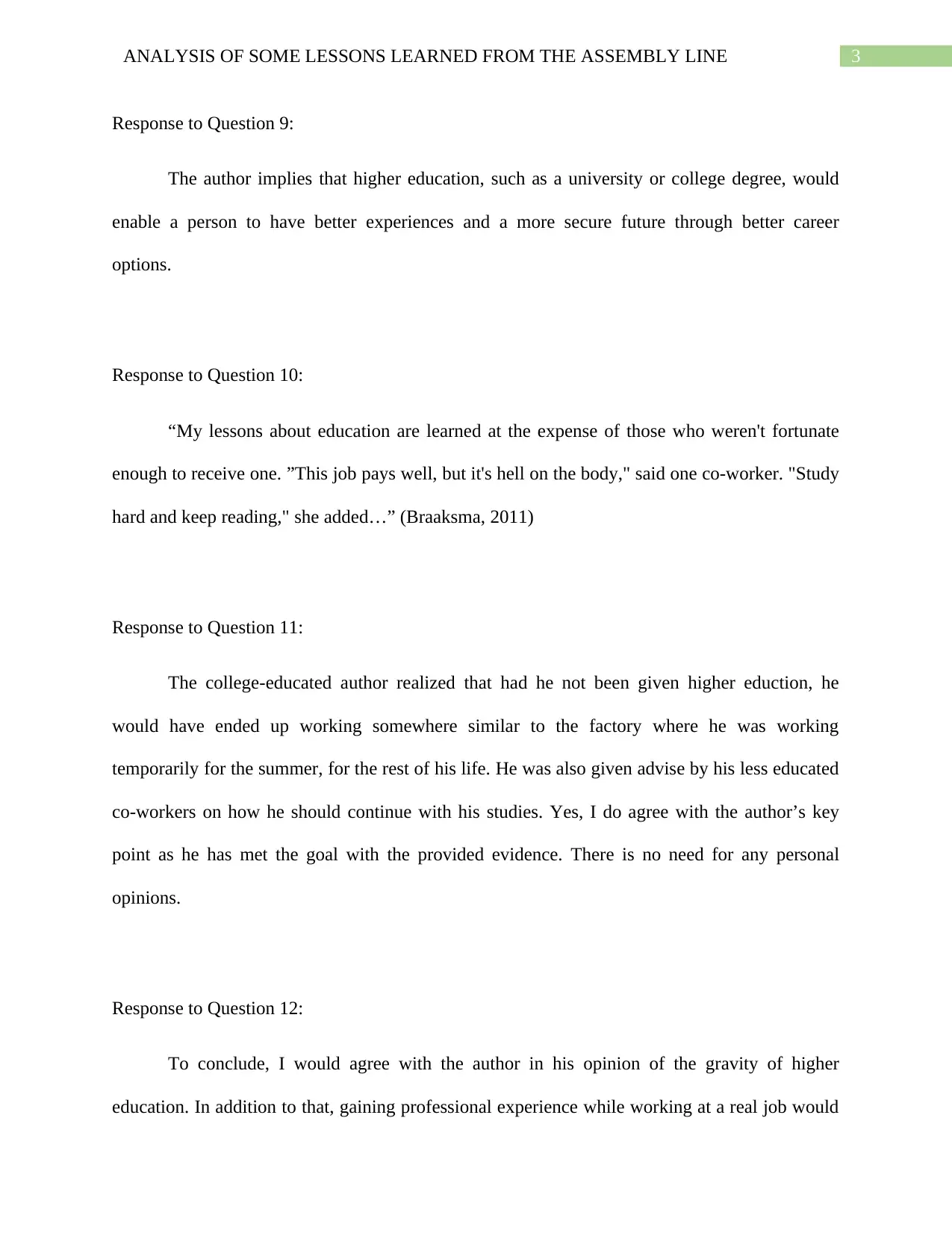
3ANALYSIS OF SOME LESSONS LEARNED FROM THE ASSEMBLY LINE
Response to Question 9:
The author implies that higher education, such as a university or college degree, would
enable a person to have better experiences and a more secure future through better career
options.
Response to Question 10:
“My lessons about education are learned at the expense of those who weren't fortunate
enough to receive one. ”This job pays well, but it's hell on the body," said one co-worker. "Study
hard and keep reading," she added…” (Braaksma, 2011)
Response to Question 11:
The college-educated author realized that had he not been given higher eduction, he
would have ended up working somewhere similar to the factory where he was working
temporarily for the summer, for the rest of his life. He was also given advise by his less educated
co-workers on how he should continue with his studies. Yes, I do agree with the author’s key
point as he has met the goal with the provided evidence. There is no need for any personal
opinions.
Response to Question 12:
To conclude, I would agree with the author in his opinion of the gravity of higher
education. In addition to that, gaining professional experience while working at a real job would
Response to Question 9:
The author implies that higher education, such as a university or college degree, would
enable a person to have better experiences and a more secure future through better career
options.
Response to Question 10:
“My lessons about education are learned at the expense of those who weren't fortunate
enough to receive one. ”This job pays well, but it's hell on the body," said one co-worker. "Study
hard and keep reading," she added…” (Braaksma, 2011)
Response to Question 11:
The college-educated author realized that had he not been given higher eduction, he
would have ended up working somewhere similar to the factory where he was working
temporarily for the summer, for the rest of his life. He was also given advise by his less educated
co-workers on how he should continue with his studies. Yes, I do agree with the author’s key
point as he has met the goal with the provided evidence. There is no need for any personal
opinions.
Response to Question 12:
To conclude, I would agree with the author in his opinion of the gravity of higher
education. In addition to that, gaining professional experience while working at a real job would
Paraphrase This Document
Need a fresh take? Get an instant paraphrase of this document with our AI Paraphraser
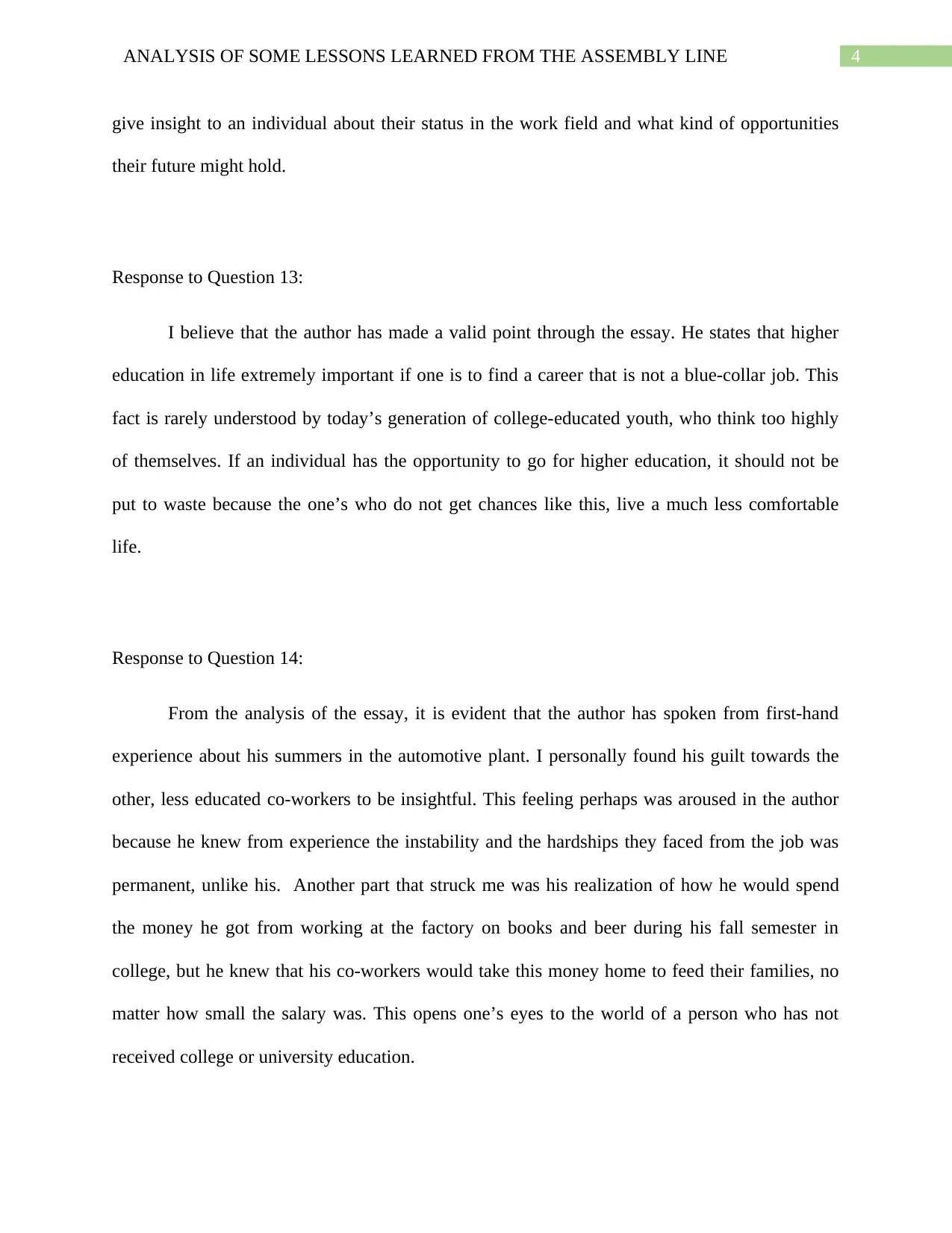
4ANALYSIS OF SOME LESSONS LEARNED FROM THE ASSEMBLY LINE
give insight to an individual about their status in the work field and what kind of opportunities
their future might hold.
Response to Question 13:
I believe that the author has made a valid point through the essay. He states that higher
education in life extremely important if one is to find a career that is not a blue-collar job. This
fact is rarely understood by today’s generation of college-educated youth, who think too highly
of themselves. If an individual has the opportunity to go for higher education, it should not be
put to waste because the one’s who do not get chances like this, live a much less comfortable
life.
Response to Question 14:
From the analysis of the essay, it is evident that the author has spoken from first-hand
experience about his summers in the automotive plant. I personally found his guilt towards the
other, less educated co-workers to be insightful. This feeling perhaps was aroused in the author
because he knew from experience the instability and the hardships they faced from the job was
permanent, unlike his. Another part that struck me was his realization of how he would spend
the money he got from working at the factory on books and beer during his fall semester in
college, but he knew that his co-workers would take this money home to feed their families, no
matter how small the salary was. This opens one’s eyes to the world of a person who has not
received college or university education.
give insight to an individual about their status in the work field and what kind of opportunities
their future might hold.
Response to Question 13:
I believe that the author has made a valid point through the essay. He states that higher
education in life extremely important if one is to find a career that is not a blue-collar job. This
fact is rarely understood by today’s generation of college-educated youth, who think too highly
of themselves. If an individual has the opportunity to go for higher education, it should not be
put to waste because the one’s who do not get chances like this, live a much less comfortable
life.
Response to Question 14:
From the analysis of the essay, it is evident that the author has spoken from first-hand
experience about his summers in the automotive plant. I personally found his guilt towards the
other, less educated co-workers to be insightful. This feeling perhaps was aroused in the author
because he knew from experience the instability and the hardships they faced from the job was
permanent, unlike his. Another part that struck me was his realization of how he would spend
the money he got from working at the factory on books and beer during his fall semester in
college, but he knew that his co-workers would take this money home to feed their families, no
matter how small the salary was. This opens one’s eyes to the world of a person who has not
received college or university education.
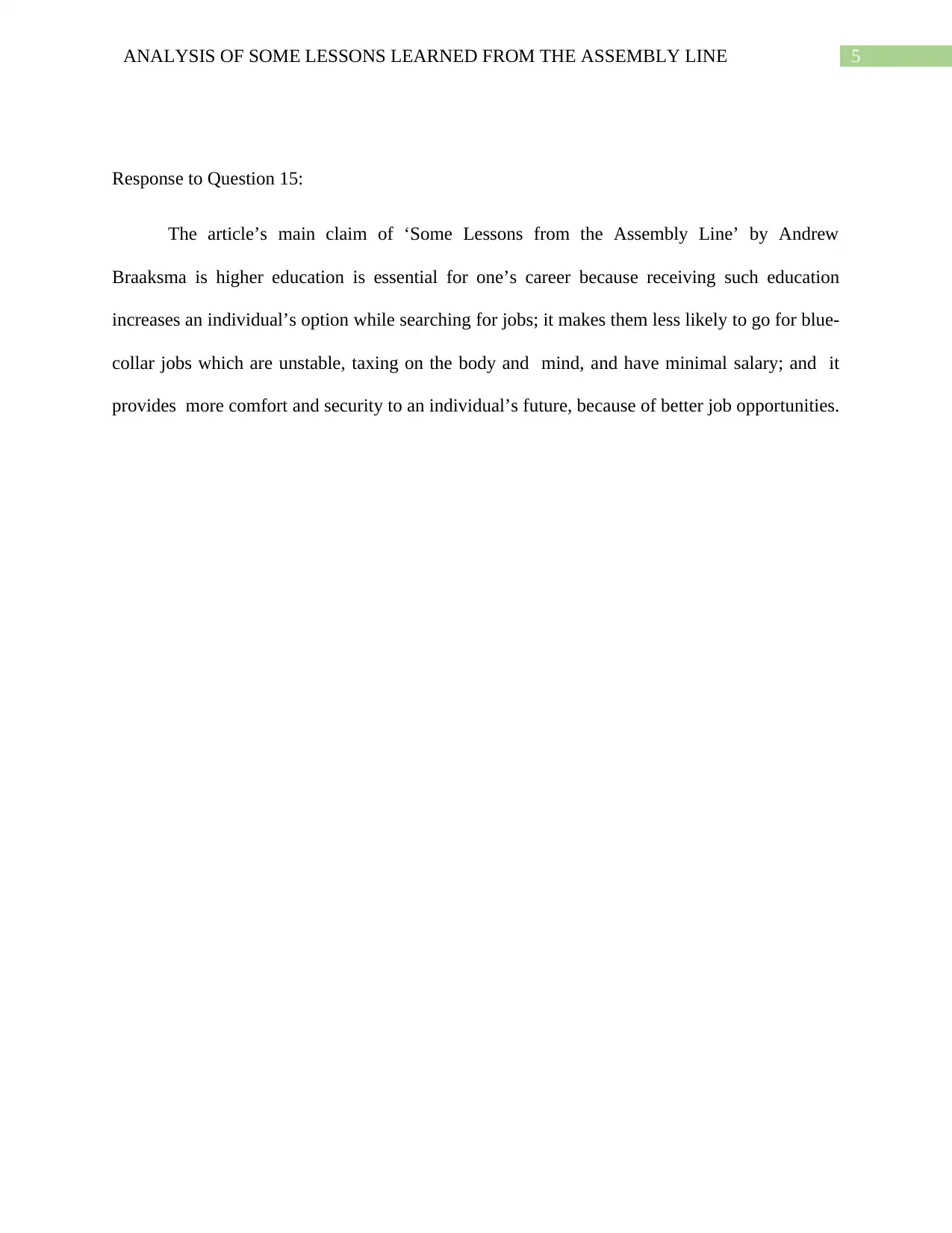
5ANALYSIS OF SOME LESSONS LEARNED FROM THE ASSEMBLY LINE
Response to Question 15:
The article’s main claim of ‘Some Lessons from the Assembly Line’ by Andrew
Braaksma is higher education is essential for one’s career because receiving such education
increases an individual’s option while searching for jobs; it makes them less likely to go for blue-
collar jobs which are unstable, taxing on the body and mind, and have minimal salary; and it
provides more comfort and security to an individual’s future, because of better job opportunities.
Response to Question 15:
The article’s main claim of ‘Some Lessons from the Assembly Line’ by Andrew
Braaksma is higher education is essential for one’s career because receiving such education
increases an individual’s option while searching for jobs; it makes them less likely to go for blue-
collar jobs which are unstable, taxing on the body and mind, and have minimal salary; and it
provides more comfort and security to an individual’s future, because of better job opportunities.
⊘ This is a preview!⊘
Do you want full access?
Subscribe today to unlock all pages.

Trusted by 1+ million students worldwide
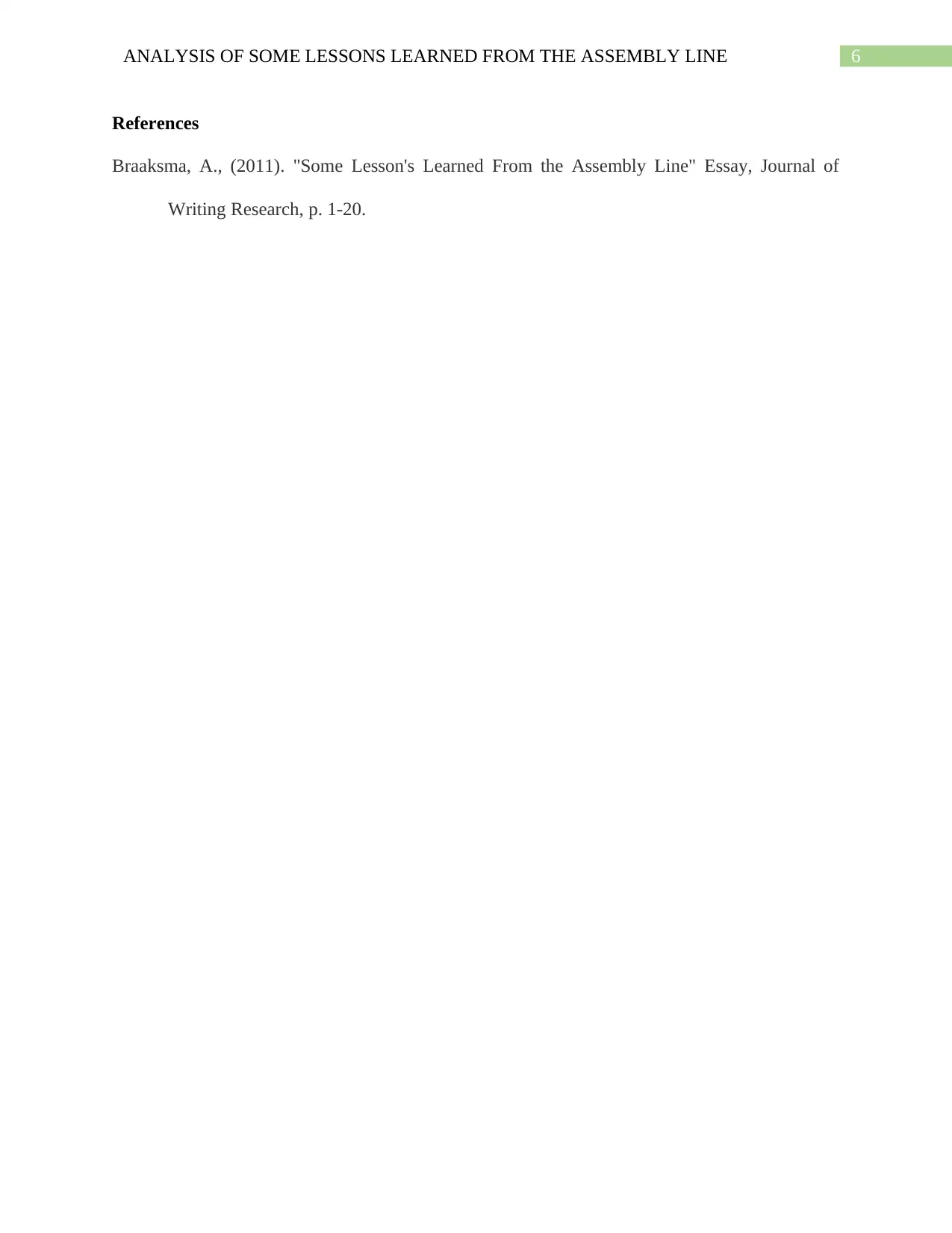
6ANALYSIS OF SOME LESSONS LEARNED FROM THE ASSEMBLY LINE
References
Braaksma, A., (2011). "Some Lesson's Learned From the Assembly Line" Essay, Journal of
Writing Research, p. 1-20.
References
Braaksma, A., (2011). "Some Lesson's Learned From the Assembly Line" Essay, Journal of
Writing Research, p. 1-20.
1 out of 7
Related Documents
Your All-in-One AI-Powered Toolkit for Academic Success.
+13062052269
info@desklib.com
Available 24*7 on WhatsApp / Email
![[object Object]](/_next/static/media/star-bottom.7253800d.svg)
Unlock your academic potential
Copyright © 2020–2025 A2Z Services. All Rights Reserved. Developed and managed by ZUCOL.





